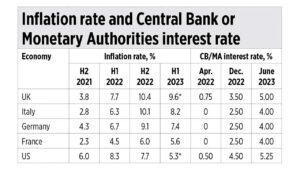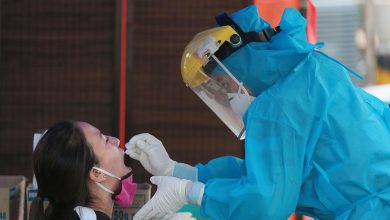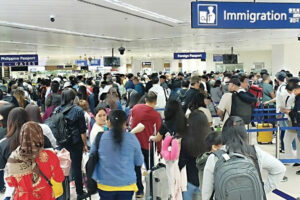Year 1 of Marcos Jr.: Inflation and interest rates

(2nd of 4 parts)
There were two pieces of good news reported by the Philippine Statistics Authority (PSA) last week.
One, that the inflation rate further decelerated to only 5.4% in June 2023, from 6.1% the previous month. It was also 6.1% in June 2022.
Two, the unemployment rate further declined to only 4.3% of the labor force in May 2023, from 4.5% the previous month and 6% in May 2022.
The underemployment rate was also down to only 11.7% of the labor force in May 2023, from 12.9% the previous month, and 14.5% in May 2022.
The Inter-Agency Committee on Inflation and Market Outlook (IAC-IMO) headed by the Secretaries of the Department of Finance (DoF), the NEDA, and the Department of Budget and Management (DBM), is producing good results from their efforts.
Doing market-oriented reforms at home, keeping taxation policies stable and predictable, then announcing these in face-to-face meetings with investors in key cities abroad, these are among the useful innovations made by the economic team of the Marcos Jr. administration.
A report last week in BusinessWorld caught my attention: “Rate cuts eyed if inflation falls below 4%” (July 7).
Bangko Sentral interest rates increased fast last year, from 2% in April to 5.5% in December, it is now 6.25%. The big jump in interest rates failed to cool down prices until early 2023, implying that the monetary policy has not been really effective in stabilizing prices.
The main inflation generator last year, especially in the second half (H2) or July-December, was transport (high oil prices) followed by alcoholic beverages and tobacco (ABT), then food and non-alcoholic beverages. Since oil is a public good, a necessity by almost everyone, people would endure high inflation but not let go of their cars or motorcycles or trucks.
In the first half (H1) of 2023, the main inflation generator is ABT followed by food, then restaurants and accommodation/hotel services. Transport inflation has receded due to lower oil prices. This implies that people are going out more to eat, drink, smoke, and party. If so, this may slow down inflation deceleration but will perk up GDP growth.
I now compare inflation rate of various countries, also interest rates by central banks or monetary authorities (CB/MA). In H1 2023, Bangladesh, India, and the Philippines have had among the highest inflation rates and interest rates in Asia. The US and European countries have had the biggest jump in interest rates, from zero in April 2022 to 4%, 5% in June 2023 (see the table).
The high inflation in ABT, food, restaurants, and accommodation this year could be an explanatory factor why the Philippines’ GDP growth in the first quarter of 6.4% was the highest among the major economies (top 50 largest GDP size) in the world. People were going out more, spending more, which expands consumer demand and supply, which expands overall GDP.
The decline in unemployment rate and underemployment rate in May this year is further proof that consumer and business confidence is high in the country. People are doing more entrepreneurial activities, hiring others or hiring themselves — they should be backed up by low interest rates.
On this consideration, the BSP may consider reducing the interest rate sooner and not wait for the inflation rate to reach below 4% by October. More domestic businesses should expand fast as consumer confidence is high, and high interest rates can discourage more loan takeout for business expansion.
The Marcos Jr. administration overall is doing good when it comes to economic achievement in year one. Even if inflation stays at 4-5% in the coming month, so long as the unemployment rate is 4.5% or lower, so long as the GDP quarterly growth is 6% or higher, that would be a tolerable trade off.
Meanwhile, the Program in Development Economics Alumni Association (PDEAA) of the UP School of Economics will hold its homecoming on Aug. 19, Saturday, at 4 p.m., at the school auditorium.
Confirmed guest speakers are DoF Secretary Benjamin Diokno (7th PDE batch) and DBM Secretary Amenah Pangandaman (33 PDE batch). Graduates of PDE are encouraged to attend this educational and entertaining homecoming event.
Bienvenido S. Oplas, Jr. is the president of Bienvenido S. Oplas, Jr. Research Consultancy Services, and Minimal Government Thinkers.




